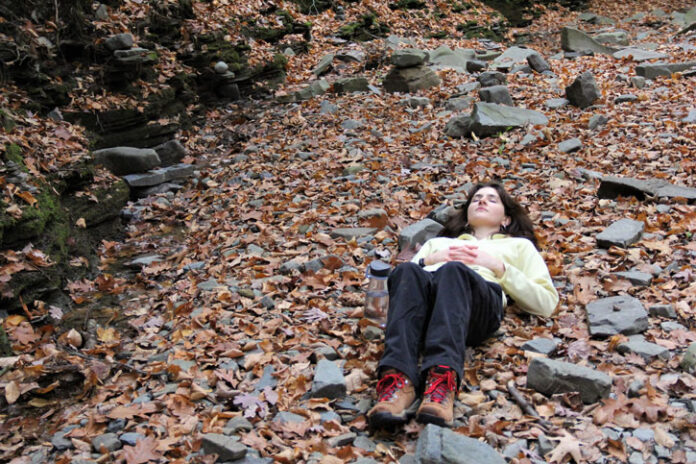Students at Binghamton University are easing the stress that comes along with daily college life through forest bathing. This offering comes via OUT177: Hiking which is a credit-based course with Outdoor Pursuits, a program area under Campus Recreation.
Originally a Japanese meditation technique, forest bathing relaxes the mind through natural immersion and offers many health benefits. Exposure to sunlight and nature can improve sleep quality; reduces anger, fear and stress; and increases positive feelings.
The class is taught by Elias Miller, an adjunct professor, who made the incorporation of forest bathing more intentional in recent years. Now, his classes practice five-minute mediation sessions at the end of each hike.
“Hiking is unique in its ability to provide both physical and mental benefits,” said Miller. “There’s something about spending time in nature and greenery that’s really healthy for students, and I wanted to hone in that aspect of the class. It’s not just about the physicality of hiking but absorbing your surroundings and being mindful through meditation.”
Class Characteristics
Laura Cichostepski, the assistant director of Marketing, said the hiking class sizes are small and personal, capped at 12 students.
“This both limits environmental impact and facilitates a closer group bond,” said Cichostepski. “The location differs from class to class with students having the opportunity to explore county parks, state forests, local trails and Binghamton University’s 190-acre nature preserve.”
Cichostepski said Miller’s classes are energetic social hikes with a focus on skill building. Students learn how to read maps, identify local wildlife and navigate trails, all while working together to build a cooperative group dynamic.
In contrast, the forest bathing sessions are slow, reflective and quiet. These short sessions at the end of each hike help students fully immerse themselves in the present moment and connect with the natural world surrounding them.
Student reaction from participating in forest bathing is positive thus far with most feedback praising the escape the activity offers.
“After pushing yourself physically, the forest puts you in a different headspace,” said Phoebe Paul, a Binghamton senior and class participant. “It’s easy to let your mind drift, and your thoughts are going to be more positive afterward.”
Passive Recreation Benefits
Passive and leisurely recreation has been a recent growing trend in the industry. Cichostepski said passive recreation like forest bathing sustains the environment, and it helps participants build a stronger connection with nature.
“Popular passive recreation options include hiking, natural observation and photography, canoeing, and cross-country skiing,” said Cichostepski. “Additionally, participants get up close and personal with the natural world and reap the incredible health benefits of spending time outdoors. It’s also a great way to welcome novices to recreation since the barrier to entry is low.”
Binghamton Campus Recreation offers several courses teaching passive recreation skills: horseback riding, disc golf, fly fishing, skiing, bicycling and hiking. The department also offers non-credit activities such as group hikes focused on natural observation, introductory skills workshops for sports like cross-country skiing, and one-day tournaments for sports like disc golf.
Cichostepski said while not every college and university may have access to a nature preserve on campus, there are still plenty of ways to add passive recreation activities like forest bathing to campus life.
“Any quiet green space, like a local park with trees, can help your students experience the benefits of forest bathing,” said Cichostepski. “Before starting the session, participants should turn off their devices and end conversations. Then, instructors can guide students to focus on their senses and surroundings while encouraging them to take long, deep breaths. Students may stand, sit or lie down — whatever position is most comfortable for them.”
For more information about how Binghamton encourages well-being in the classroom, visit the Healthy Campus Initiative: B-Healthy webpage.
Want more updates and information on how campus recreation is improving student well-being? Sign up for a digital subscription here.
Credit: Source link































